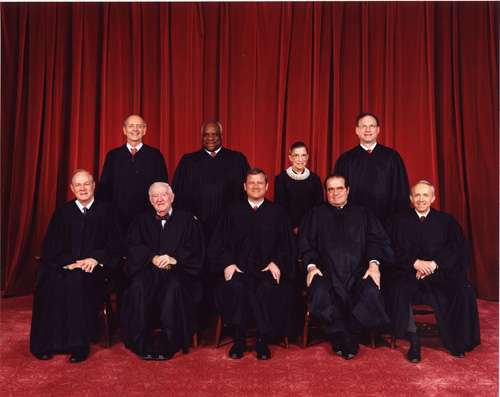The Volokh Conspiracy
Mostly law professors | Sometimes contrarian | Often libertarian | Always independent
Today in Supreme Court History: November 24, 2001
11/24/2001: Salim Hamdan was captured in Afghanistan. The Supreme Court would decide his case in Hamdan v. Rumsfeld (2006).

Editor's Note: We invite comments and request that they be civil and on-topic. We do not moderate or assume any responsibility for comments, which are owned by the readers who post them. Comments do not represent the views of Reason.com or Reason Foundation. We reserve the right to delete any comment for any reason at any time. Comments may only be edited within 5 minutes of posting. Report abuses.
Please to post comments


Hotel Employees Local 255 v. Leedom, 358 U.S. 99 (decided November 24, 1958): Court here ends the NLRB's longstanding hands-off policy as to hotels keeping unions out
Kedroff v. St. Nicholas Cathedral of Russian Orthodox Church, 344 U.S. 94 (decided November 24, 1952): striking down on Free Exercise grounds New York statute requiring Russian Orthodox churches to have separate in-state corporate status (as opposed to being administratively subject to Patriarch of Moscow); the opinion contains a history of the disruption caused by the Bolshevik Revolution and Patriarch's eventual accommodation with the Soviets (the American branch had the right to disassociate when that happened, but it couldn't be written into law)
Hawkins v. United States, 358 U.S. 74 (decided November 24, 1958): conviction under Mann Act (transporting woman across state boundaries for prostitution) overturned; issue was over the purpose of the trip, and error to allow defendant's wife to testify against him (violated common law rule as to spousal testimony, and wife was also a prostitute and had conflict of interest) (Stewart, concurring, calls the rule against spousal testimony "a sentimental relic")
What if it’s the woman driving? Is the guy still transporting the woman?
And how would the court know it was a woman?
Good questions!
More importantly, and with pretty much kind of connection to the US Supreme Court, today in 1942 Billy Connolly was born!
On a sadder note, on this day in 1923 Justice Sutherland’s college roommate’s old girlfriend’s brother’s neighbor’s cleaning lady’s aunt’s beagle was run over by a Model T Ford on Worrall Street in Woonsocket, R.I. (I could mention the driver, but he had no connection with the Supreme Court.)
Summary of Scalia’s concurrence in Hamdan:
“Owing to separation of powers and the clear intent of the Constitution, Congress cannot remove judicial oversight. The entire judicial proceeding against him was defective, lacking any reasonable due process. Nor is it all clear that what Hamdan has been charged with is even a crime according to the customary laws of war or treaties, the latter of which at least, are binding on the US per the Constitution.”
But as Hamdan was one of "them", there is no way that Scalia would have found for him, regardless of the law or of his pious claims to reach decisions according to the law even if he didn’t like the consequences. Instead, he issued another one of his whining where not outright hysterical dissents.
Why were Scalia and Stevens the only ones to say unambiguously that citizens accused of treason had to be tried in regular court for treason (unless they were detained without habeas corpus like in the Civil War)?
https://supreme.justia.com/cases/federal/us/542/507/
The other justices seemed willing to let citizens get less than the constitutionally-guaranteed procedure for treason trials. Were the other justices othering the prisoner?